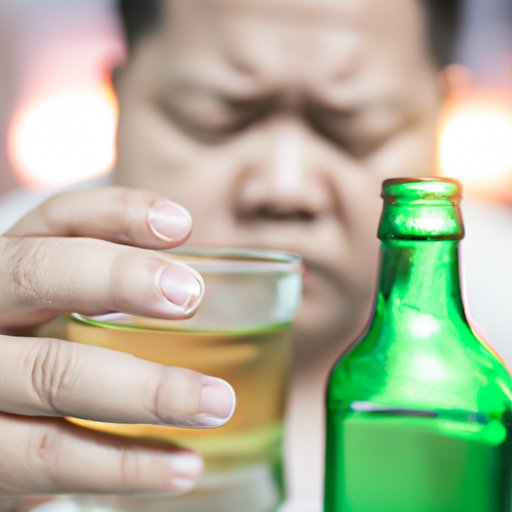
Introduction
Drinking alcohol is a common social activity, but for some, the aftermath of a night of drinking can be brutal. Hangovers are the unpleasant side effects of consuming too much alcohol, and they can range in severity from mild headaches and nausea to more severe symptoms like vomiting, dizziness, and extreme dehydration. However, can you die from a hangover? This article will explore the potential risks and dangers of excessive drinking, and provide tips on how to avoid hangovers and stay safe while drinking.
The Dangers of Hangovers: Can a Night of Fun Lead to Death?
When it comes to alcohol, moderation is key. Consuming too much alcohol can have a serious impact on your body, leading to long term consequences and even death in extreme cases. Hangovers occur when the body is trying to recover from the effects of alcohol, and the severity of a hangover can vary depending on several factors, including the amount of alcohol consumed, the type of alcohol, and an individual’s physical factors like age, weight, and gender.
In severe cases, an extreme hangover can lead to death. When a person drinks too much alcohol, it can cause their blood alcohol concentration (BAC) to reach dangerous levels, which can result in alcohol poisoning. Symptoms of alcohol poisoning can include confusion, seizures, and even coma or death. Therefore, it’s important to understand the dangers of excessive drinking and take steps to prevent alcohol poisoning and other serious consequences.
What Happens to Your Body During a Hangover?
A hangover is essentially your body’s response to alcohol. When you consume alcohol, it can cause dehydration which can lead to the headache, dizziness, and nausea commonly associated with a hangover. Alcohol can also irritate your stomach lining, increase your heart rate, and reduce your body’s ability to absorb important nutrients, leading to malnutrition and a weakened immune system.
In more severe cases, a bad hangover can lead to dehydration and electrolyte imbalances, which can be dangerous if left untreated. This is because alcohol can reduce the production of a hormone called vasopressin, which helps the body retain water. Without enough water, your organs can start to shut down, leading to seizures, low blood pressure, and even coma.
Recognizing the Signs of Alcohol Poisoning
Alcohol poisoning is a serious and potentially life-threatening condition that can occur after consuming a large amount of alcohol in a short period of time. Symptoms of alcohol poisoning include confusion, vomiting, seizures, and difficulty breathing. If you suspect someone is suffering from alcohol poisoning, it’s important to seek medical attention right away. In extreme cases, alcohol poisoning can be fatal.
It’s important to note that alcohol poisoning can occur even if a person has not had enough alcohol to cause a hangover, so it’s crucial to recognize the symptoms and take action as soon as possible. If someone is exhibiting any of the signs of alcohol poisoning, call for emergency services immediately.
How to Prevent Hangovers and Stay Safe While Drinking
One of the best ways to prevent a hangover is by drinking in moderation. This means limiting your alcohol intake to one or two drinks per hour, depending on your body weight and tolerance. It’s also important to stay hydrated by drinking plenty of water and other non-alcoholic beverages throughout the night.
In addition, it’s important to know your limits and know when to stop drinking. Drinking to excess can increase the risks of experiencing serious health problems, including alcohol poisoning. Finally, never drink and drive or operate heavy machinery while under the influence of alcohol. Not only is it illegal, but it can also lead to serious accidents and injuries.
Hangover Horror Stories: Real-life Consequences of Overindulging
There are many stories of people experiencing severe hangovers that have led to hospitalization or even death. These stories serve as a reminder of the dangers of excessive drinking and the importance of taking steps to stay safe while drinking alcohol.
One real-life example is the story of a young man who died after a night of binge drinking. He had been out with friends and consumed a large amount of alcohol. When his friends tried to wake him up the next morning, they discovered that he had passed away in his sleep. The cause of death was alcohol poisoning, which was attributed to his excessive drinking the night before.
Another example is the story of a woman who had a severe allergic reaction to the ingredients in a popular energy drink that she had consumed while drinking alcohol. She experienced symptoms like itchiness and difficulty breathing and was rushed to the hospital. While her reaction was not directly caused by alcohol, it serves as a reminder of the importance of being aware of the substances you are consuming while drinking alcohol, and to remember that mixing energy drinks and alcohol can be dangerous.
Conclusion
While hangovers themselves may not be fatal, they can be a signal that you have had too much to drink and could be at risk of more serious consequences like alcohol poisoning. It’s important to recognize the signs of a hangover and take steps to prevent them by drinking in moderation and staying hydrated. Remember to always stay safe while drinking and know your limits.





